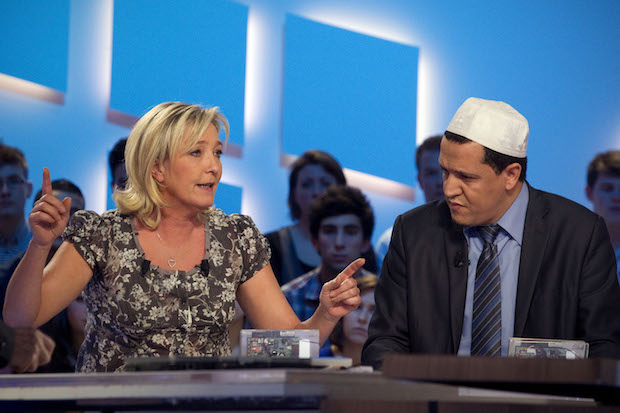The National Front were out in force at my local Parisian market on Saturday. A coterie of volunteers handing out leaflets with suitably festive bonhomie. I took one from a smiling middle-aged woman. It was titled ‘Au Nom Du Peuple’ and there was a photograph of the party’s leader, Marine Le Pen, looking pensive. She’s dropped the surname for her election campaign. It’s deemed too toxic, what with her reptilian father’s reputation for playing down the holocaust and playing up the sins of homosexuality.
There’s a message from Marine at the top of the page, an extract from a speech she gave in September this year. ‘Nobody should ignore that this presidential election is about an inescapable choice,’ she said during an address at Frejus on the Côte d’Azur. ‘Either a France with her sovereignty, her identity, her values, her prosperity, or a country that we no longer recognise, in which we will become strangers.’
Beneath the quotation Le Pen expands on her major campaign issues. The European Union is firmly in her sights, with her reiteration to put France’s membership to the vote if elected, and she also vows to ‘break with mass immigration’. There’s mention of ‘reconquering’ urban no-go zones, lowering taxes and what she calls ‘economic patriotism’.
One of the most eye-catching pledges is near the foot of the page. If elected president, Le Pen promises to ‘defend the rights of women, their freedoms and their dignity, put in danger by fundamental Islam.’
It’s a clever strategy. On a train back to Paris recently from eastern France I fell into conversation with the woman sitting to me, a chic, forty-something, who was head of human resources for a large company in the French capital. Having a broad English accent in France has some advantages, one of which is a lowering of the Gallic guard, leading people to reveals secrets that they might not tell one of their own for fear of being judged.
That’s what this woman said, having just told me she’ll be voting for Le Pen. When I asked why, her reply was immediate. ‘Islam.’
She’s frightened for the future of France, frightened for her two young daughters. ‘If something’s not done, then by the time they’re my age, they will be wearing the veil,’ she said.
Alarmist? Not judging by a report broadcast on the primetime French news last Wednesday. Entitled ‘Quand Les Femmes sont Indésirables’ [When the women are unwanted], the report began with two Muslim members of a Women’s Rights group, carrying a concealed camera, attempting to order a coffee in Sevran, a north-eastern suburb of Paris.
The men in the bar aren’t in traditional Muslim dress; they’re dressed in jeans and tracksuits, and wearing their misogyny like a badge of honour. The women are curtly informed this is a cafe for men. One of the women asks a customer what his wife or cousin would do if they came into the cafe in search of a drink. They wouldn’t, he replied. They’re at home. The other woman reminds the men that they’re in France. No, they retort, here it’s the ‘Bled’, a word of North African origin meaning a small village in the sticks.
On leaving the bar the two women explain to the camera that in the last decade Islam in France has become a ‘penal code’ with an increasing list of interdictions, many aimed at subjugating women. As the pair talk a car full of men pulls up. The occupants say nothing; their gaze does the talking. Clearly intimidated, the women stop the interview.
In the same report the journalist experiences similar misogyny in parts of Lyon, with one young mother telling the camera as she pushes a pram that she dresses ‘sombrely’ and forgoes wearing make-up when she goes out. Why? asked the journalist. ‘We’re scared,’ says the mother.
Marine Le Pen wants to harness this fear in the forthcoming presidential election in the hope it will win her the female vote. It could do, although François Fillon, the centre-right candidate will challenge her for it. The same can’t be said of the French left who, like their British counterparts, are still trying to pretend there’s nothing to see as far as the Islamists and their treatment of women goes.
In the wake of the summer burkini row, Marianne, a weekly French magazine, interviewed several prominent Francophone Muslim women, and asked what could be done to combat the growing misogyny within Islam in France. One, the Algerian-born essayist Djemila Benhabib, complained that while some non-Muslim feminists supported them, many sided with the Islamists, in particular over the right of women to wear the veil ‘in the name of individual liberty’. In doing so they had lent ‘respectability and legitimacy to these dubious characters’. Benhabib had this message to those feminists: ‘From now on, I put you on the same level as the Islamists. I make no distinction, because you’re knowingly colluding with them.’
Another interviewee, the French-Moroccan artist Majida Khattari, blamed the French Republic for ‘losing confidence in itself’ when confronted with the rise of conservative Islam, a similar accusation levelled at the British government following the publication last week of the Casey report. ‘The politicians have become accustomed to turning to the imams and the radicals in hoping to win the vote of their communities,’ said Khattari. ‘It’s the way to submission, which weakens Muslim women in France when they are in need of protection from the machos of the Mosque.’
Marine Le Pen says she will do what no male politician in France has done, and protect the women of France from these machos. Hillary Clinton failed to win the support of her sisters in last month’s American election; but Le Pen might have more joy with the females of France.







Comments